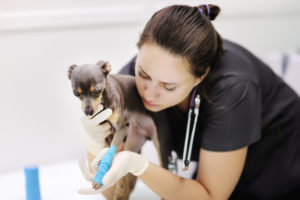
Please join us to celebrate National Veterinary Technician Week!
Veterinary technicians are crucial to the daily function of veterinary practices and have significant roles in preserving animal health and welfare. During National Veterinary Technician Week (October 16-22, 2022), our team honors its commitment to high-quality veterinary care for all animal patients. Please join us in celebrating vet tech week!
What Does a Veterinary Technician Consist Of?
Veterinary technicians are animal nurses and much more. Besides their nursing duties, they also work as patient advocates, radiology technicians, phlebotomists, surgery technicians, laboratory technicians, dental hygienists, and anesthesia technicians. They help the doctor in appointments, administer prescribed medications to your pet, and maintain the hospital clean and safe for patients. They also assist in surgery, perform necessary treatments on your pet, and educate pet owners on doctor recommendations.
What is a Vet Tech’s Typical Day?
A veterinary technician wears many hats on a typical day. During your pet’s office visit, a vet tech will take a detailed health history and obtain your pet’s vital signs before the veterinarian enters the room. Then, they will gently hold your pet during the veterinarian’s exam, prepare your pet’s medications, and provide a brief training on administering them at home. Additionally, a vet tech works hard at assisting with X-rays, laboratory work, anesthesia, and surgery. In the hospital’s treatment area, they also collect patient samples for lab tests to help diagnose complex medical issues. They may draw blood, collect patients’ urine, or walk a patient to receive feces for analysis.
Your veterinary technician is the one who positions your pet and obtains the radiographs so the doctor can diagnose your fur baby. The technician is also the one who cleans your pet’s teeth and obtains dental radiographs so the doctor can visualize any abnormalities unable to be seen by the naked eye. Your pet needs an IV catheter to administer lifesaving fluids. Your vet tech is the one who places that catheter and begins your pet’s fluid therapy!
The veterinary technician is also the one who maintains much of the laboratory equipment that doctors use to diagnose and treat your pets. Without them, the doctors wouldn’t be able to use the tools they need to get your pet healthy again!
A Vet Tech’s Surgery Responsibility
When an animal patient needs anesthesia, the vet tech will obtain your pet’s vitals prior to anesthesia. They will also draw blood as necessary for testing to ensure your pet is healthy enough for surgery. Or evaluate if any alterations to the anesthesia plan need to be made. The vet tech will place an IV catheter and calculate and administer the correct amount of IV fluids. After your pet has been anesthetized using IV medications, the vet tech will place a breathing tube for oxygen and anesthetic gas administration.
Also, the technician shaves the patient’s coat and prepares the surgical site to ensure the doctor is performing a sterile procedure. During surgery, the technician stands by the pet’s side, overseeing vital signs to ensure the pet is at a safe anesthetic level. After surgery, the technician will monitor your pet until they fully recover from anesthesia. Once that is over, the vet tech then cleans and sterilizes all the surgical equipment to ensure it’s ready for the next patient.
Overall, veterinary technicians frequently work long, physically demanding shifts to fulfill their passion for assisting pets to stay healthy. Our doctors and your pets rely on them every day. Make sure you remember to thank your vet techs!
Here at Mount Carmel Animal Hospital, We’ll Treat Your Pets Like Family!
Mount Carmel Animal Hospital has been serving the Northern Baltimore/Southern York community for over 30 years and is proud to be an independently operated, small animal practice committed to excellence in veterinary medicine and client service. From grooming to wellness services, along with Canine Life Skills Training Courses, and surgical procedures, we have the expertise that will best serve the needs of you and your pet. Contact us at 410-343-0200 and follow us on Facebook!
